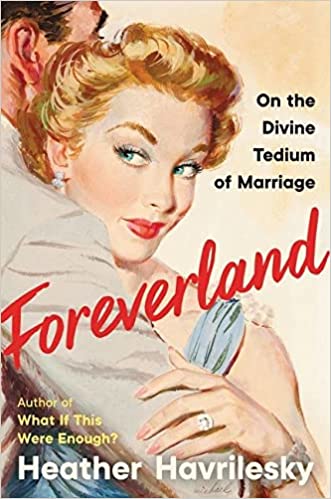Foreverland: On the Divine Tedium of Marriage by Heather Havrilesky

Foreverland: On the Divine Tedium of Marriage is a snarky memoir by Heather Havrilesky, an advice columnist. She has been married long enough to know that Foreverland sometimes feels less like a sweet ride through the Tunnel of Love and more like a few go-rounds on a ghastly roller coaster designed to make you hurl.
Read on…
A lot of people hate this book. They’re deeply offended that Heather Havrilesky sometimes hates her husband, that she says it’s okay to hate your spouse, and that she wrote about all the ways that marriage kind of sucks. These people sincerely can’t fathom the shitty parts of marriage, or, probably more realistically, feel uncomfortable that someone said the quiet part loud.
You’re not supposed to complain about marriage. You’re not supposed to complain about suburbia or how weird it is to interact with other people with whom the only thing you have in common is kids of the same age. You’re not supposed to say that the noises your husband makes in his sleep make you homicidal. You’re not supposed to say much of what Havrilesky says if you’re a good and polite person.
Maybe the critics are taking Havrilesky super-seriously, too — what some reviewers read as snobbery I took as a self-deprecating, trying hard to talk big thing instead. It’s a book, y’all, and a memoir at that. Everyone is an unreliable narrator of our own lives. I think Havrilesky likely embellishes the bad times a bit in the way that we all tell our stories a little bigger when we have an audience.
Maybe I’m weird for nodding sagely along with the concept that you can love your spouse and feel miserable, and recognize that marriage, just like the people in it, is imperfect. But this book cracked me up from the opening paragraph.
Every book about marriage is also a book about mortality, since the success of any marriage is defined not by happiness or good fortune but by death. The assignment, after all, is to stay together until you die. Once one spouse perishes, the marriage has succeeded. Death signals victory.
It’s not all resentment and awful noises, though. I appreciated Havrilesky’s willingness to pick up the challenging parts of her marriage, hold them to the light, and dissect what each spouse has to improve. She is also honest about her flaws and the things that both husband and wife do to meet each other in the middle (even if the middle is indeed the middle of house-is-in-flames chaos).
The ending felt incongruently tidy; a hasty ‘but it’s all good in the end’ annunciation after pages of exploring why so much of marriage is a day-to-day dance. I recognize that all books have to end somehow, but the veer off into And They All Lived Happily Ever After was disconcerting.
TL;DR: This is a frank book about a subject that doesn’t usually garner a lot of honesty. You’re either going to love or hate it, but it will make you feel something.


